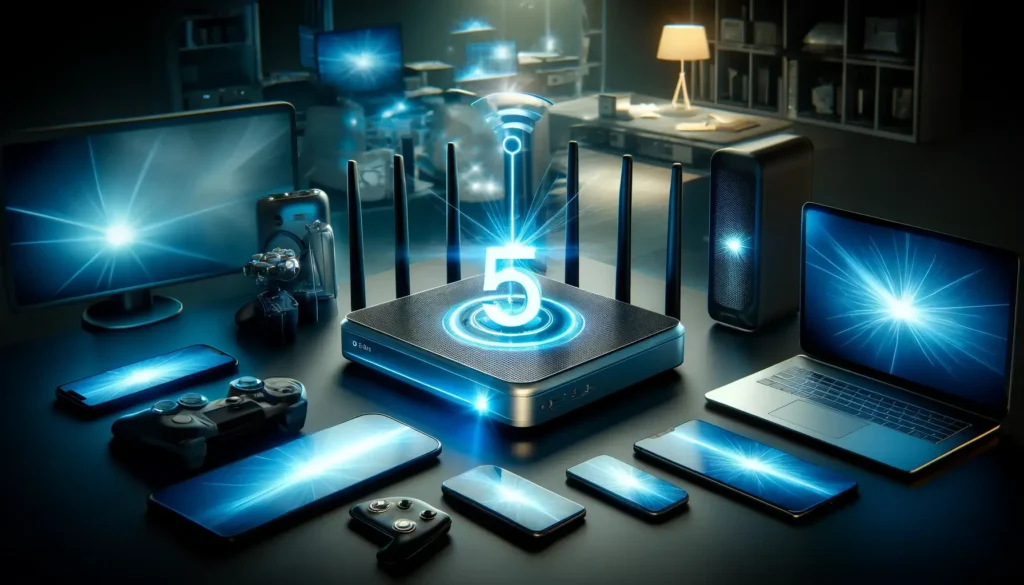Your Verizon 5G Home Internet can accommodate up to 25 devices concurrently. This impressive capacity is enabled by advanced technology like MU-MIMO, which permits simultaneous communication with multiple devices. However, remember each connected device demands a portion of bandwidth; activities with high bandwidth requirements could potentially impact your connection speed. Network settings, signal strength, and device functionality may also influence connectivity. To maximize your service’s benefits, consider the function of each device, eliminate unnecessary connections, and manage bandwidth-intensive tasks. There’s a wealth of insights that could further optimize your usage!
Understanding Verizon 5G Home Internet
To understand Verizon’s 5G Home Internet, it’s important to explore details such as the number of devices that can connect to a 5G router, the cost of different plans, and potential additional charges.
So, how many devices can connect to a 5G router? With Verizon’s technology, you’re looking at a maximum of 25 devices. But remember, the more devices, the more bandwidth you’ll need.
What’s the cheapest plan for Verizon internet? Currently, that’s the 200 Mbps plan at $39.99 per month. But, how much does Verizon charge for Wi-Fi only? It’s part of the package, so you’re not paying extra for it. However, the price might seem steep if you’re comparing it to other services. What service has the cheapest internet? That’s a toss-up between providers like T-Mobile Home Internet and Starry Internet.
Why is Verizon Wi-Fi so expensive? It’s due to the infrastructure and the high-speed, reliable service they offer. Is there a setup fee for Verizon internet? No, there isn’t. Does Verizon charge for a router? Yes, there’s a $15 monthly fee. And does Verizon charge for Wi-Fi usage? No, your data usage is unlimited.
The Capacity of Verizon 5G Router
While you might be taken aback by Verizon’s 5G router’s ability to connect up to 25 devices simultaneously, it’s important to dig deeper into this technical marvel’s unique capacity and efficiency. The router’s high device capacity is due to its advanced technology, specifically, its use of 5G, the fifth generation of wireless communication. This technology enables the router to handle multiple devices without a hitch, granting you the freedom to connect your entire digital ecosystem.
But it’s not just about quantity. The router’s efficiency also lies in its quality of connection. With 5G, it offers high-speed, low-latency internet, which means your connected devices can all enjoy a smooth, lag-free experience. This is particularly advantageous if you’re streaming, gaming, or performing other bandwidth-intensive tasks.
Furthermore, the router’s MU-MIMO (Multi-User, Multiple-Input Multiple-Output) technology allows it to communicate with multiple devices at the same time, increasing its overall efficiency. With this feature, you’re not just getting a router that can handle numerous devices, but one that can manage them all effectively.
This detailed analysis showcases how Verizon’s 5G router’s potent capacity liberates your digital experience.
Factors Influencing Device Connectivity
Understanding the myriad factors influencing device connectivity on your Verizon 5G router isn’t just about counting the number of devices it can support; it’s a deeper exploration into the technology’s intricate web of specifications and performance parameters.
Firstly, the nature of the devices affects the connection. Not all gadgets are created equal; some require more bandwidth due to their functions. High-definition streaming, online gaming, or heavy data transfers demand more from the router than simple web browsing or email checking.
Next, the router’s capacity and specifications play a critical role. The more advanced your router, the more devices it can handle efficiently. A router’s CPU, memory, and Wi-Fi standards are pivotal in managing device connectivity.
Signal strength is another factor. The farther a device is from the router, the weaker the connection. Walls, floors, and other obstructions can also interfere with signal propagation, diminishing your device’s connectivity.
Lastly, network security settings can limit connectivity. Higher security settings may restrict the number of devices that can concurrently connect.
Recognizing these factors allows you to optimize your internet usage, ensuring freedom in your digital pursuits without compromising on speed or stability.
Don’t just count your devices; understand their connectivity.
Impact of Multiple Devices on Speed
In the midst of managing multiple devices on your Verizon 5G router, it’s important to understand how this can greatly impact your connection speed. Let’s explore the technical aspects to comprehend this better.
Every device that you connect to your Verizon 5G network uses a portion of your overall bandwidth. This means that the more devices you have connected, the more your bandwidth is split, potentially leading to slower speeds.
For example, if you’re streaming in 4K on your smart TV while simultaneously downloading a large file on your computer, you might notice a drop in your internet speed. This effect is amplified during peak usage times when multiple devices are simultaneously drawing on the network’s resources.
Your speed can also be affected by the type of activity each device is engaged in. High bandwidth activities like video streaming or online gaming consume more resources than simple browsing or emailing.
It’s critical to manage the number of devices connected to your network and their activities to maintain the best performance of your Verizon 5G Home Internet. Remember, your freedom to connect is only as good as your network’s ability to handle the load.
Comparison With Other Internet Providers
Comparing Verizon’s 5G home internet service with other providers can give you a clearer perspective about its competitiveness in the market. Verizon 5G, with its lightning-fast speeds and low latency, positions itself as an industry leader. However, it’s important to analyze how it stacks up against competitors like AT&T, T-Mobile, and Comcast.
AT&T’s 5G home internet offers competitive pricing but their speeds can’t hold a candle to Verizon’s. T-Mobile’s Home Internet service, though cheaper, is currently limited to 4G in most areas, depriving you of the ultra-fast experience that 5G offers. Comcast’s Xfinity Internet, while offering a range of speeds, can’t match the peak speeds of Verizon’s 5G.
Unlike many competitors, Verizon’s 5G home internet doesn’t limit your freedom with data caps or throttled speeds. You can connect multiple devices without worrying about speed drops. Also, Verizon’s transparent pricing policy, with no hidden fees or contracts, gives you the liberty you desire.
How to Maximize Verizon 5G Usage
To truly make the most out of your Verizon 5G home internet, it’s essential that you’re familiar with the number of devices it can support and how to effectively manage your network. Knowing your bandwidth demand and optimizing it’s key. Remember, every device connected to your network, whether it’s a laptop, smart TV, or gaming console, consumes a piece of your bandwidth pie.
If you’re looking to maximize your usage, start by evaluating the needs of your devices. High-demand gadgets like gaming consoles and streaming devices should be prioritized. Consider scheduling downloads during off-peak hours to avoid network congestion.
Next, make sure your router is located in a strategic spot. Walls and other physical barriers can disrupt the signal, so placing your router in a central, open location is crucial.
Lastly, utilize the network management tools that Verizon offers. You can prioritize certain devices, control access, and even set up a guest network to separate your main network from visitors’ devices.
You have the freedom to tailor your Verizon 5G experience to your unique needs. By effectively managing your network, you can maximize your internet usage and get the most from your Verizon 5G home internet.
Troubleshooting Verizon 5G Connectivity Issues
When you’re experiencing issues with your Verizon 5G home internet, it’s important to have some troubleshooting strategies up your sleeve. To start with, check the connection to your router. Make sure it’s powered on and your device is connected to the right network.
If you’re still not online, a simple restart could solve the problem. Unplug your router, wait 30 seconds, and plug it back in.
If that doesn’t work, examine your 5G device’s signal strength. Weak signals can cause connectivity problems. You might need to move your device closer to the router or remove any physical barriers that could be blocking the signal.
Next, consider the number of devices connected to your network. Each device consumes bandwidth and can slow down your connection. Disconnect unnecessary devices to free up bandwidth.
If you’re still having trouble, the issue might be with your 5G device, not the network. Test the device on another network or try a different device on your network.
If your device works on another network, it’s likely a problem with your Verizon 5G home internet. In this case, contact Verizon’s customer support for further assistance.
Testimonials From Verizon 5G Users
After troubleshooting your Verizon 5G home internet, you might be curious about others’ experiences with this service. Many users have reported a significant improvement in speed and reliability compared to their previous networks. They’ve noted the ability to seamlessly stream 4K videos, play online games, and use multiple devices without experiencing lag or buffering.
In terms of capacity, users who live in larger households have seen their Verizon 5G handle up to 20 devices simultaneously. This includes laptops, smartphones, smart TVs, gaming consoles, and more. They’ve noticed no significant decrease in speed or performance, even when multiple devices are streaming or downloading large files.
However, some users have reported occasional drops in connection and slower speeds during peak hours. These issues are often short-lived and can typically be resolved with a quick reset of the router.
While the service does come with a higher price tag, many users feel the benefits outweigh the costs. They appreciate the freedom to use multiple devices without worrying about speed or performance issues.



